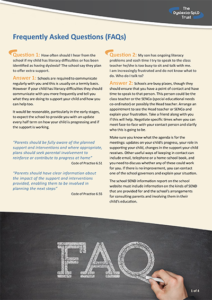frequently-asked-questions
Answers
Question 1: How often should I hear from the school if my child has literacy difficulties or has been identified as having dyslexia? The school say they plan to offer extra support.
Answer 1: Schools are required to communicate regularly with you and this is usually on a termly basis. However if your child has literacy difficulties they should communicate with you more frequently and tell you what they are doing to support your child and how you can help too.
It would be reasonable, particularly in the early stages, to expect the school to provide you with an update every half term on how your child is progressing and if the support is working.
Question 2: My son has ongoing literacy problems and each time I try to speak to the class teacher he/she is too busy to sit and talk with me. I am increasingly frustrated and do not know what to do. Who do I talk to?
Answer 2: Schools are busy places, though they should ensure that you have a point of contact and have time to speak to that person. This person could be the class teacher or the SENCo (special educational needs co-ordinator) or possibly the Head teacher. Arrange an appointment to see the Head teacher or SENCo and explain your frustration. Take a friend along with you
if this will help. Negotiate specific times when you can meet face-to-face with your contact person and clarify who this is going to be.
Make sure you know what the agenda is for the meetings: updates on your child’s progress, your role in supporting your child, changes in the support your child receives. Other useful ways of keeping in contact can include email, telephone or a home-school book, and you need to discuss whether any of these could work for you. If there is no improvement, you can contact one of the school governors and explain your situation.
The school SEND information report on the school website must include information on the kinds of SEND that are provided for and the school’s arrangements for consulting parents and involving them in their child’s education.
Question 3: I am attending a meeting about support for my child who has reading problems. If I give information to the SENCo or Head will it remain confidential?
Answer 3: This is a difficult question as the information you provide on your child may be circulated to a number of people who are responsible for his/her learning. If there is personal information you wish to share with the Head or SENCo, you need to state that you do not want this information to be generally shared across the school.
However, any information that could affect your child’s learning is likely to be recorded. Schools are used to dealing with children who have a range of difficulties
and are aware of the need to be sensitive to the needs
of parents/carers. Explain your anxieties and concerns to the school and it is likely they will be able to reassure you.
Question 4: The school has been given an independent psychologist’s report that says my child who is 8 years old has ‘moderate dyslexia’.
When I gave the report to the school they said that my child doesn’t need extra help. I can’t understand why. If she has dyslexia then surely she is entitled to extra support?
Answer 4: The school will be monitoring your child’s progress in literacy; ask what measures they are taking to monitor this and why they think this is satisfactory. If a child is receiving the right provision and making satisfactory/good progress based on prior attainment then, an identification of dyslexia is not likely to change this.
Many schools have improved their provision at
Wave 1 to make sure it is dyslexia-friendly and to
meet the needs of a wide range of children. Schools have to make difficult decisions on the use of resources and extra support.
Talk to the school and ask about whether they have dyslexia-friendly status and what is in place to support your dyslexic child. Check that your child is making satisfactory/good progress. This should hopefully reassure you.
Question 5: I am worried about my child who is in reception as he seems to be falling behind the rest of the class. He cannot read yet and isn’t interested in books. At what point should my child get extra help?
Answer 5: Children, particularly in the Foundation Stage, are at various stages of development and there can be major differences between children in their attitudes and readiness for reading.
Your child may be receiving some support through the Wave 1 provision and this may be sufficient.
Schools can use a wide range of strategies and activities to motivate and interest your child. Talk to the school and ask how you can help your child. You can encourage an interest in the written word by reading to your child and alerting your child to words and sounds around him/her.
Progress is key to this question and if he continues to make little or no progress despite adjustments in Year 1 then the school should discuss this with you. There is a Wave 2 intervention that many schools use in Year 1 to help boost progress.
If your child is not making adequate progress given their age and starting point, then your school may feel it would be more beneficial to use a Wave 3 intervention. Schools are advised to intervene early for children with identified literacy difficulties, so an intervention should be offered before a child goes into year 3.
Question 6: My child has had reading difficulties all through school. My child is now in year 4 and receiving extra support with reading and phonics. The school is using a teaching assistant for this supportbut surely it should be a teacher?
Answer 6: I can understand your concern as it is generally felt that a trained teacher will make a greater difference than a teaching assistant. However, we now have research that tells us that a well-trained teaching assistant with the right support can make as much difference to children with literacy difficulties as a teacher. There are large numbers of teaching assistants working within our schools under the direction of teachers. Their work is reviewed and evaluated on a regular basis. Many of these teaching assistants have substantial experience of working with children with literacy difficulties.
The school should be monitoring your child’s progress to ensure the extra support is making a difference and keeping you informed.
Question 7: My child is receiving a Wave 3 intervention that is not listed on your website. Should I be concerned?
Answer 7: We are aware that there will be some new interventions that have been developed where there is little or no evidence as yet on whether they are effective.
We have only included interventions on the website where there is sufficient evidence to say that they can work well for children.
Talk to the school about why they have chosen this intervention for your child. Is it targeted at your child’s needs, highly structured and delivered on a regular basis? The bottom line is whether it works for your child. The school should be monitoring the impact of the intervention and hopefully the information will then become part of the evidence.
Question 8: What happens after a Wave 3 intervention? The intervention my child had was very successful and I would like the school to carry on but they say no.
Answer 8: Wave 3 interventions usually have a specific time span. The research we have in this area shows that children tend to make good progress over the first few weeks of an intervention, but if the intervention is extended over a lengthy period this progress slows down and can level out.
Schools therefore provide intensive interventions over a short period to maximise progress. The child is then usually monitored to see if the new skills and knowledge they have gained during the intervention are used in the classroom.
Interventions are about making a child more independent and less reliant on adult support. Many children, given a boost, will continue to make good progress.
Question 9: My child is now receiving an intervention programme for his/her reading. What can I do to support my child.
Answer 9: Discuss this with the school as there may be specific things you can do as part of the intervention programme. The school might suggest activities your child can bring home to build on and consolidate their learning. Reading to your child on
a regular basis will support what is taking place in school. It is also important to provide praise wherever possible, as we know that children who feel good about themselves find learning easier.
Question 10: My child has severe literacy difficulties and sometimes it feels as if no other parent is experiencing the same sort of problems. I think it would help if I had some support too.
Answer 10: Talk to the school as they might put you in contact with other parents. Literacy difficulties are not uncommon and other parents can offer support and reassurance.
There is a SEND Information, Advice and Support Service (IASS) in every local authority This service will provide information, advice and support for parents
of children and young people with SEN or disabilities, young people and children with SEN or disabilities about education, health and social care. These services provide legally based, impartial, confidential and accessible information, advice and support,and will
be able to offer face to face, telephone and electronic
information and advice as well as casework and representation when needed. IASSs will often work with parents and children/young people together, but must also ensure that they are able to provide a service directly and separately to children and to young people.
Dyslexia Action has written on-line guidance
for parents on the SEND reforms: http://www.dyslexiaaction.org.uk/changes-special-educational-needs-and-disability-send-provision
The Dyslexia-SpLD Trust continues to recruit
Parent Champions across the UK. https://www.parentchampions.org.uk/become-a-parent-champion/ The Trust supports parents and carers of children with dyslexia and specific learning difficulties through the expertise of its partner organisations. Collectively they have a wealth of expertise.
Helpful Contacts:
The British Dyslexia Association (BDA) have local support groups.
British Dyslexia Association
Website: www.bdadyslexia.org.uk
Telephone: 0845 251 900
Dyslexia Action have local teaching and assessment centres.
Dyslexia Action
Website: www.dyslexiaaction.org.uk
Telephone: 01784 222 300

